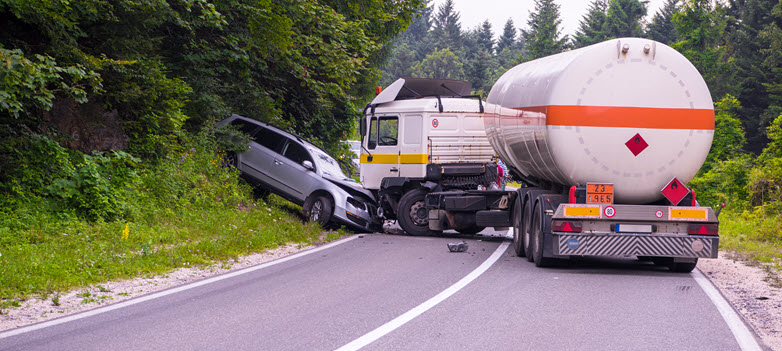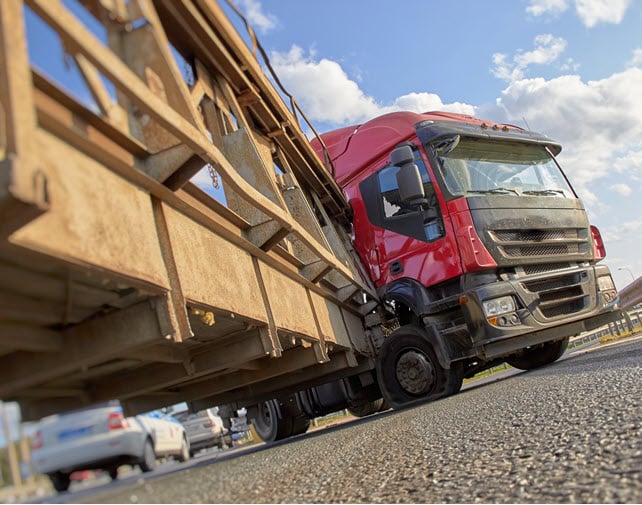
Free Case Evaluation
South Carolina Jackknife Accident Lawyers

Strong advocacy when you've been injured in a jackknife trucking accident in SC
A truck jackknife is one of the scariest events on a highway. When a truck jackknifes, the tractor-trailer spreads across the highway, threatening the life of the driver and any vehicles near the truck. At McGowan, Hood, Felder & Phillips, LLC, we understand why truck jackknife accidents happen and who is responsible. We demand full compensation for anyone who is injured due to a truck accident and the families of anyone who dies in a truck accident. We’ve been fighting for personal injury victims for more than 20 years. Let us help you today.
Free Case Evaluation

How Can We Help?
What is a jackknife accident?

According to the Federal Motor Carrier Safety Administration (FMCSA), in 2020, there were 4,842 fatal jackknife accidents and 107,000 jackknife accidents that caused injuries.
A truck jackknife involves trucks with a tractor (cab) and a trailer. These trucks include tractor trailers, semi-trucks, big rigs, and 18-wheelers. The tractor and trailer are normally joined by a hitch. The combination (tractor and trailer) must travel in the same direction at the same speed. If the tractor skids, moves at a different speed than the trailer, or the driver turns suddenly, the trailer can move into the tractor, spinning the tractor around. The movement is similar to a blade folding into the handle of a knife – thus the term jackknife.
The net result of the spinning movement is that the tractor and trailer end up at a sharp angle from each other. Some truck jackknife accidents in South Carolina cause the truck to roll over. The truck combination often spreads across a highway occupying several lanes of travel – creating havoc for any cars or other vehicles nearby.
Why do jackknife accidents happen in South Carolina?

Truck jackknife accidents are usually due to driver error. Some of the reasons a tractor or trailer loses traction include:
- Improper braking. A truck driver who slams on their brakes is almost asking for a jackknife accident to occur. Drivers of trucks should leave plenty of distance and time to make a slow stop. Truck drivers should avoid braking while going downhill. It’s better to slow down beforehand. Drivers should consider using their regular brakes instead of the engine brakes.
- Speeding. The faster a truck goes, the harder it is for the driver to make a controlled stop – to properly brake the truck combination. Drivers should adjust their speed in curves so that they slow down before entering the curve instead of in the middle of the curve. Drivers need to avoid swerving and braking simultaneously.
- Skidding. Improper braking and other factors such as wet roadways can cause the tractor to skid – leading to a truck jackknife accident.
- Bad weather. Truck drivers should understand how to brake when it’s raining or the roads are wet for any reason.
- Poor maintenance. The hitch, brakes, tires, and suspension should all be examined regularly. Wear and tear to any of these truck parts can be dangerous.
- Driver distraction, driver intoxication, and driver fatigue. Drivers who are not fully focused on their driving can easily be forced to brake suddenly which can cause a truck jackknife accident.
- Inexperience. The truck companies that employ truck drivers should ensure that their drivers understand the proper way to prevent jackknife accidents from occurring – according to South Carolina and federal truck industry standards.
Another factor that contributes to truck jackknife accidents is how the truck is loaded. Generally, tractor-trailers are more likely to jackknife if the truck is partially loaded – compared to fully loaded or empty.
What jackknife preventive measures should be used?
In addition to using safe driving techniques, truck drivers and trucking companies should consider which devices may help reduce the risk of a truck jackknife. Some of these devices include:
- Anti-lock brakes can help reduce heavy-vehicle accidents.
- Electronic brakes can help the rear brakes take control when a truck driver brakes too hard.
- Electromagnetic brakes may also help.
These devices do come with their own set of risks.
Who is liable for a jackknife accident?

Our South Carolina truck accident lawyers work with investigators, the police, and truck safety experts to examine how truck accidents happen and who is responsible. The defendants in a truck jackknife accident may include:
- The truck driver. In virtually every truck jackknife accident, the driver did something they shouldn’t have done or failed to do something they should have done.
- The truck driver’s employer. Employers in South Carolina are generally vicariously (automatically) liable for the negligence of their drivers. Our truck accident lawyers are skilled at showing drivers are employees and not independent contractors. Employers may also be liable for their own negligence, including failing to conduct background checks on their employees’ driving records (history of other accidents or citations) and experience.
- The owner of the truck. Trucking companies and individuals who allow a driver to use their truck for a delivery may also be liable for any negligent conduct of the driver. For example, if the owner knows their truck’s brakes are wearing down, they can be held liable if they fail to tell the driver before the driver starts the truck.
- The companies involved in the shipment. These companies include the broker (the company that arranges the shipment), the loading company, the company that requested the shipment, and the company that is receiving the shipment. For example, one or more of these companies may be liable if they pressured the driver to speed in order to make a timely delivery. Loading companies may be liable if they fail to properly secure the load, causing the driver to lose control of the truck.
- Truck maintenance and repair companies. These companies may be liable if they fail to conduct timely inspections of the truck brakes and other truck parts – or fail to either make timely and quality repairs or take the truck off the road until the repairs could be completed.
- Truck manufacturers. If a defective hitch, brake, tire, or any other truck part caused the truck to jacknife, the manufacturer may be liable for any injuries or fatalities that occur. The distributors and sellers of the truck may also be liable.
- A tavern or other seller of alcohol. In South Carolina, sellers of alcohol may be liable for a truck accident if they served a driver while they were visibly intoxicated or a minor – and the driver then caused an accident.
Other defendants may include other drivers, or the South Carolina Department of Transportation if poor road design or maintenance contributed to the truck jackknife accident.
How do you prove fault in a jackknife accident case?

At McGowan, Hood, Felder & Phillips, LLC, we’re strong advocates for personal injury victims and the families of loved ones who died due to truck jackknife accidents. We fight for you by:
- Investigating the accident site, the damage to the truck, the damage to all vehicles including yours, and all other physical evidence of the truck wreck.
- Requesting to formally review the truck’s black box, shipment assignment, previous inspections, and other critical data. The black box information can help establish how fast the truck was traveling and the driver’s journey just before the accident occurred.
- Reviewing the FMCSA laws that regulate truck inspection, truck maintenance, driver Hours of Service requirements, and other FMCSA guidance to determine if the trucking companies and drivers failed to be in compliance. We also review the loading requirements governed by the Occupational Safety and Health Administration (OSHA) and any other federal and state truck regulations such as the proper weight and size of trucks.
- Working with your doctors and financial experts to verify your injuries, medical care, income loss, pain and suffering, and other damages. We also work with experts who can evaluate your wrongful death claim if a loved one dies in a truck jackknife accident.
- Negotiating settlements with the insurance carriers
- Arguing your case before a jury if your case does not settle.
Do you have a South Carolina jackknife truck accident lawyer near me?

Our truck accident lawyers consult with clients at our South Carolina locations. These locations include:
We also represent clients throughout South Carolina in all 46 counties, including Sumter, Anderson, Orangeburg, Hilton Head, Aiken, and Spartanburg.
If you’re unable to come to our office, we can make arrangements to see you away from the office. Our lawyers also conduct consultations by phone and through video discussions.
We can explain how a truck accident lawsuit works and guide you through the litigation process.
Speak with our experienced South Carolina truck accident lawyers today
Whether you collided with the truck, were struck by other cars, or were injured in any other way; our South Carolina truck jackknife lawyers are ready to help. We’re proud of our preparation, tenacity, skill, and experience. Our lawyers are fearless insurance negotiators and trial lawyers. To schedule a free consultation, call us at or complete our contact form to schedule a free consultation. We handle truck accident cases on a contingency fee basis.

